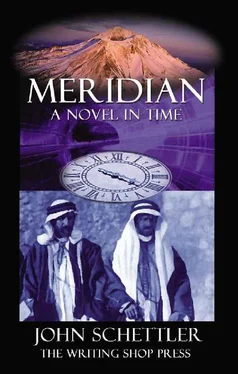Nordhausen’s finger marked a place in his book. “They approached the rail line again near Minifir on the 9 thto lay their last explosive charge at the culvert near Kilometer 172. They fled east after the attack, across the line into the desert to reach Abu Sawana again. We should be on the west side of the line then, probably here.” He fingered a location near the rail line close to Minifir, then keyed a new query for the cartography data base. In a few moments he had coordinates for Minifir, and extrapolated from that location to choose a drop point. “I hate rushing like this,” he muttered to himself as he worked. Kelly leaned over his shoulder and began scribbling the coordinates down.
“Take off another second in each direction,” said Nordhausen. “Lord, it looks like open desert on the map, but we’ve no way of knowing what was really there. We could appear right in the middle of some wandering band of Bedouin vagrants, for all I know.”
“It’ll have to do,” said Kelly as he started off. “If anything changes, let me know at once.”
“I’ve got to get over to the Drama Department.” Maeve realized she had a lot of rummaging to do in the wardrobe.
Kelly came up short, fishing in his pocket and tossing her the keys to the Subaru. “Here,” he said. “You’ll have to drive yourself. I need another twenty minutes on the Arion system.”
“We’ll come with you, Maeve,” said Paul. “Now that we have our coordinates, we might as well carry on the preliminary briefing. Listen everyone. We’ve got to get up to Lawrence Labs as soon as possible. We’ll come back for you, Kelly, but if you finish ahead of us, take University Drive and head for the East Gate. Then we can take Gayley up to Hearst Avenue and head up past the Cyclotron to the lab.”
The Lawrence Berkeley Laboratories were just beyond the campus, up a winding way called Cyclotron Road. Born on the Berkeley campus, the facilities had grown considerably over the years, and eventually moved to the rolling green hills that overlooked the university. A host of scientific disciplines were rooted in the lab, which was a major center of research and a place where some of the most profound questions imaginable were asked, and sometimes answered, with the secret arts of Quantum Science. They took the universe apart, bit by bit, discovering atoms, protons, electrons, neutrons; and then breaking each one down into smaller and smaller particles, and watching how each one behaved. Once the physical structures of the universe were ferreted out and understood, science thought it would finally have the answer to how everything related to everything else. Soon, however, they began to encounter strange things in the corners of their vacuum chambers and cyclotrons. The deeper they looked, the more they found that the universe was playing with another set of rules altogether in the realm of the very small. Things that were once thought to be impossible, even unimaginable, suddenly became odd realities. Travel in time, long debated by physicists, was one of those unimaginable things.
One theory of time held that any given moment was simply a specific arrangement of every quantum particle that made up the universe. The particles, always in motion, created the perception of a forward progression in the flow of time, which was really nothing more than the constant variation of those particles, morphing from one state and position to another. To be in any place, or any time, all one had to do was find a way to tell all the particles of the universe to assume a given state or position in relationship to one another. Any reality that was ever possible could become this moment; this reality. The realization of the theory seemed impossible, however, for one could never know how to arrange each particle of the universe just as they were at the Globe Theatre in 1612. It was challenge enough to understand even one particle of the universe—but science held that the whole of the universe had sprung from one single point. If that were true, then any possible universe might arise in the same way.
The way, it was found, was through the seeming annihilation of a small black hole. Dorland found a theory, and the theory became an Arch. It was found that the crushing effects of gravity as one approached the singularity could be neutralized by simply getting the black hole to spin at a fantastic rate of speed. The resulting reality was like a dead spot of calm in a whirlpool, or the eye at the heart of a swirling hurricane. It was realized in the center of the Arch, and anything that passed within its aura was protected from the annihilation of the event horizon. The Arch opened and forged a safe pathway through the event horizon of a controlled black hole, and all that lay beyond it.
While it was impossible for humans to physically re-arrange the particles of the universe into a new pattern, a quantum singularity achieved this result effortlessly. Humans only had to tell the universe what they wanted—what shape and time to assume on the other side of the singularity. Mathematics was their voice, and the universe, being about nothing of any particular importance at any given moment, was kind enough to heed them and comply.
Three years later, after extensive research and with the backing of corporate sponsors and private funds, a project was born at Lawrence National Laboratories just outside the U.C. Berkeley campus in California. The government believed it was simply another particle chamber to test the theory Dorland expounded. They never dreamed that the project had reached such an advanced state, ready to actually send objects through the Arch and retract them safely. That secret, however, was closely held by the key project team leaders, project staff, and a few select individuals from Maeve’s Outcomes Committee.
Dorland was the guiding light, and a small band of dedicated physicists, engineers and mathematicians had built the first prototype of a mechanism they hoped would tame the universe at last. They had an idea, and a theory, and an Arch. They didn’t know if it would work, but had faith that it might—until a man appeared at Nordhausen’s study door that night, out of a driving rain at the edge of a storm; with a pound of Peets coffee and an answer to all their doubts. It would work.
That was the only thing that offered them consolation as they bent themselves to the feverish task of configuring the Arch that night. They were confident that they could create a new milieu that was very close to the moment they desired, but yet they were afraid nonetheless. Quantum Mechanics made promises, but would keep them at a whim, and who knows what mischief they might accomplish when they first sought to tamper with the fabric of being itself?
“Chaos is the score upon which reality is written.”
Henry Miller: The Tropic of Cancer
“Anything in history or nature that can be described as changing steadily can be seen as heading toward catastrophe.”
Susan Sontag
Lawrence Berkeley Labs – 1:15 AM
They made their rendezvous near the theatre and followed the winding route of Cyclotron Road to reach the Lawrence Berkeley Laboratories. Access to the facility was closely guarded, but each of the team members has been cleared long ago. Kelly produced his encrypted access card, rolling down the window and sliding the card through a reader. A camera was filming his face as he squinted through the drizzle of the night at the reader alcove. Somewhere, a computer was running pixels through a recognition algorithm and deciding who he was. It was enough to pass them through the first level of security that surrounded the complex.
Читать дальше












